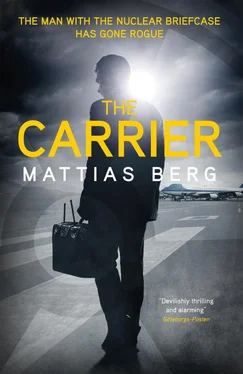Mattias Berg - The Carrier
Здесь есть возможность читать онлайн «Mattias Berg - The Carrier» весь текст электронной книги совершенно бесплатно (целиком полную версию без сокращений). В некоторых случаях можно слушать аудио, скачать через торрент в формате fb2 и присутствует краткое содержание. Город: London, Год выпуска: 2019, ISBN: 2019, Издательство: MacLehose Press, Жанр: Триллер, на английском языке. Описание произведения, (предисловие) а так же отзывы посетителей доступны на портале библиотеки ЛибКат.
- Название:The Carrier
- Автор:
- Издательство:MacLehose Press
- Жанр:
- Год:2019
- Город:London
- ISBN:978-0-85705-788-4
- Рейтинг книги:4 / 5. Голосов: 1
-
Избранное:Добавить в избранное
- Отзывы:
-
Ваша оценка:
- 80
- 1
- 2
- 3
- 4
- 5
The Carrier: краткое содержание, описание и аннотация
Предлагаем к чтению аннотацию, описание, краткое содержание или предисловие (зависит от того, что написал сам автор книги «The Carrier»). Если вы не нашли необходимую информацию о книге — напишите в комментариях, мы постараемся отыскать её.
The Carrier — читать онлайн бесплатно полную книгу (весь текст) целиком
Ниже представлен текст книги, разбитый по страницам. Система сохранения места последней прочитанной страницы, позволяет с удобством читать онлайн бесплатно книгу «The Carrier», без необходимости каждый раз заново искать на чём Вы остановились. Поставьте закладку, и сможете в любой момент перейти на страницу, на которой закончили чтение.
Интервал:
Закладка:
According to reports, which remained unconfirmed, the Russians had at the time developed a small pistol with californium for nuclear ammunition. Officially, we never got further than our experimental “Davy Crockett”, a rifle with nuclear capacity.
So as the F.16s banked sharply over Kleine Brogel and flew back in our direction, they brought with them the moment of hidden truth. Even though there would be no official comment after the event, however much the peace researchers might blog about the fact that we had demonstrated the guidance system for our future and much-debated nuclear bomb.
I was therefore not surprised when the General jumped down and took his place in the left-hand red circle. I knew what efforts were needed nowadays to get the P.R. machinery humming, the aces that we had to throw into the game.
Hughes was the only one remaining of our three most senior official nuclear weapons commanders—since both Falconetti and Goldsmith had been dismissed. The man in the right-hand circle was also immediately recognizable. R.R. Maine, the hurried replacement for Falconetti, seemed to have put on hardly two pounds since his time as an American football superstar when I was young. The article in the Washington Post had not wasted the opportunity to joke about it: that the nuclear football too was now within his field of responsibility.
I suddenly realized what Ingrid might have in mind. There could be no better opportunity than here and now to allow a live nuclear charge to detonate. The result would not only be upward of a hundred thousand civilian deaths, together with two more of our most senior military officers, ministers, observers and crucial financiers. But also the worst possible publicity for the entire nuclear weapons system.
I tried to extricate myself from the crowd, but did not get very far. The voice of the American commentator crackled excitedly through the loudspeakers. “Ladies and gentlemen, children, guests of honor, ten seconds to bomb release. Nine, eight, seven, six, five, four, three, two, one… zero!” Through my field glasses I saw the bomb in free fall for a moment before the Kevlar parachute opened and swung to and fro as it sank toward its target. Despite the night-vision capability of my field glasses, it was impossible to tell whether this was a dummy or a real bomb—and if so, a nuclear one.
The cheers were raucous, time both running out and endless. Thoughts raced through my mind. To what the debater and former missile operator Bruce Blair had said during a visit to NUCLEUS, when asked what would be needed to carry out a successful attack at a nuclear base from the inside. By swapping a dummy bomb for a real charge, for example.
He did not have to think for long.
“I would say two to three people, given today’s security system. Obviously harder the more people you have to involve,” he had said.
General Hughes moved back and forth in the larger, left-hand circle, kept staring up at the falling object through the pelting rain. He too could not hide his excitement, or perhaps the slight concern one always feels during really complex maneuvers.
Then the bomb exploded—and an enormous bouquet of flowers cascaded across the sky and showered down on him. A phenomenal firework display, it must have cost a fortune.
General Hughes played it up a little. Looked skyward, shook his head and opened out his arms, before firing off a broad white smile for the benefit of the propaganda movies which would be sent out from here. And the message was unmistakable: that our military endeavors were all for the good of mankind. Bombs with flowers. “War is peace”, as George Orwell expressed it.
Then came the last and unbeatable escalation in the propaganda warfare. When General Hughes gestured toward the smaller, red circle to the right.
With the roar of the crowd growing by the second, Falconetti’s replacement stepped forward, theatrically placed on his head a burgundy Washington Redskins helmet from the old days, enjoying the moment to the full. When he closed the yellow visor over his face it took the commentator nearly a minute to make himself heard over the crowd.
“O.K., I know he needs no introduction, so I’m just going to say R.R….”
“Maine!” the crowd chimed in.
“…right, the man himself, one of America’s all-time famous athletes. Now responsible for all our nuclear missile submarines, aircraft and land-based launch sites. Highest supervisory authority over the military space program. Our whole digital war effort. Ladies and gentlemen, a true American hero!”
A short pause over the loudspeakers. The crackle of static.
“Now he’s ready for the decisive moment. Right, General?”
The man in the helmet nodded, gave a double thumbs up, like a pilot himself.
“And, ladies and gentlemen, children, guests of honor—are you ready too? Because here comes something that’s never been done before: a trick of the absolutely highest degree of difficulty. The first demonstration of our new guidance system for precision bombs, which minimizes the risk of human casualty in humanitarian conflicts. I just want you to notice that General Maine’s circle has a twenty-five-foot diameter and that the dummy bomb is going to be released from an altitude of almost thirty-three thousand feet. So cross your fingers, everyone.”
When the only aircraft still airborne banked steeply and headed back toward us, I could clearly see through the maximum zoom on my field glasses the three, small, stylized triangles just under one of the fins of the warhead. Our own interpretation of the international nuclear symbol. The sign indicating that there really was a live nuclear charge in there.
I looked around in desperation—and saw no-one making an effort to interrupt the demonstration, prevent the catastrophe. Maybe no-one else had noticed the tell-tale markings on the warhead. One often only sees what one wants to see, after all: seldom what one cannot even imagine.
The F.16 climbed rapidly to 31,500 feet, to drop the dummy which was in fact a bomb, accompanied by the commentator’s steady countdown. “Five, four, three, two, one… Bomb release! Watch carefully now, ladies and gentlemen, children, guests of honor… because today we’re writing military history!”
I stood there as the nuclear charge fell, slow and dreamlike through the atmosphere under its neat little parachute. Expected that it would be detonated at the same altitude as the Hiroshima bomb, 1,978 feet, as a sort of homage. Thought about Ingrid’s dark allure; how infernal the elegance of her preparation of this pacifist mass murder. Letting somebody switch out the dummy—or perhaps she had done it herself—in order to turn world opinion against nuclear weapons once and for all.
The preaching over the loudspeakers rose to the level of an ecstatic evangelist: “Friday, December 13, 2013, the American base at Kleine Brogel, Belgium. You were here! This was not your unlucky day—but the luckiest day of your lives! To be part of something like this! 3,000 feet, 2,750… 2,500… Are you ready, R.R.?”
Our two-star general, the folk hero, gave the commentator in the control tower another thumbs up. Straightened his helmet, again pulled the visor over his face. I shut my eyes for some reason, put my fingers in my ears.
But I could still hear the explosion. A low, dull rumble, loud enough to be heard, but not enough to disturb.
Confused, I opened my eyes and saw that everything was still standing. Looked over at the small red circle where R.R. performed his carefully rehearsed trick, a perfect touchdown which proved that he really had stayed in good shape. Nimbly, he rolled a half turn to absorb the impact—before he touched the dummy bomb to the ground in the exact center of the ring.
Читать дальшеИнтервал:
Закладка:
Похожие книги на «The Carrier»
Представляем Вашему вниманию похожие книги на «The Carrier» списком для выбора. Мы отобрали схожую по названию и смыслу литературу в надежде предоставить читателям больше вариантов отыскать новые, интересные, ещё непрочитанные произведения.
Обсуждение, отзывы о книге «The Carrier» и просто собственные мнения читателей. Оставьте ваши комментарии, напишите, что Вы думаете о произведении, его смысле или главных героях. Укажите что конкретно понравилось, а что нет, и почему Вы так считаете.












